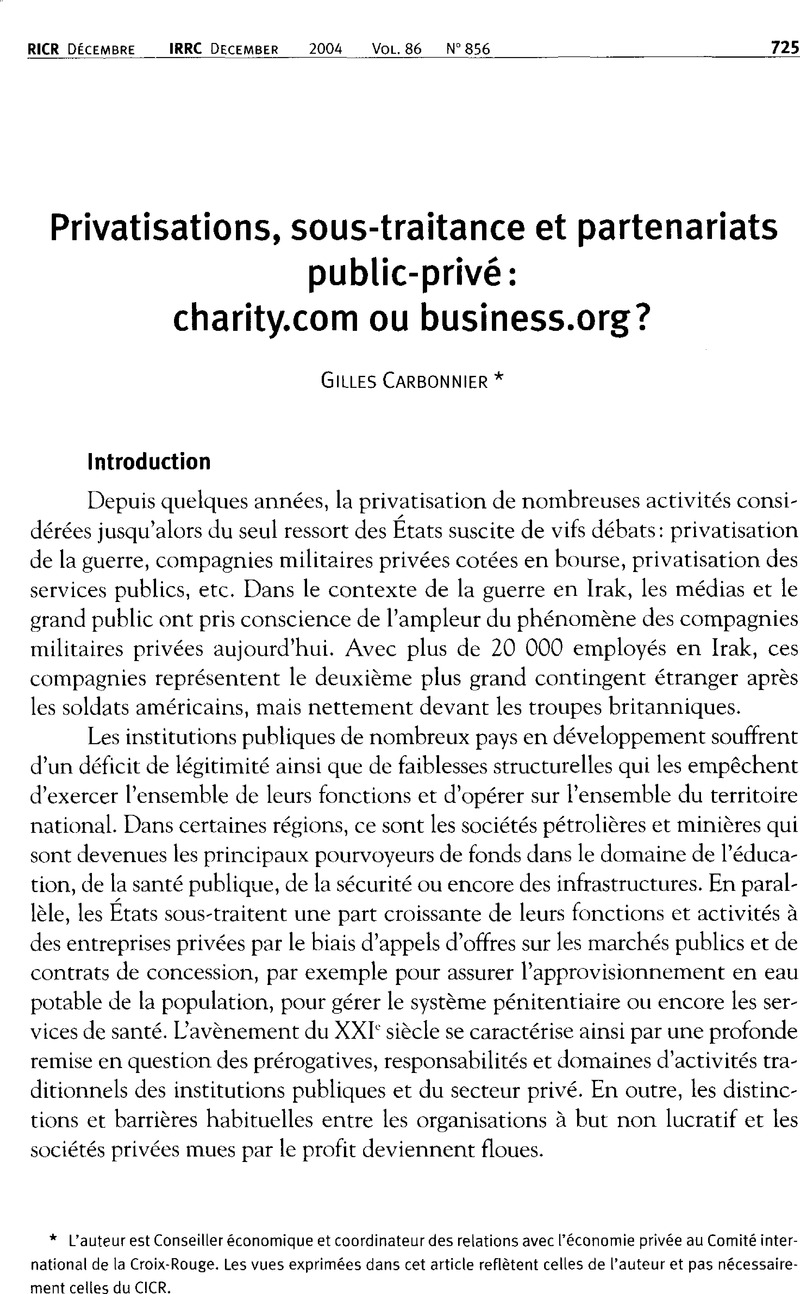Article contents
Privatisations, sous-traitance et partenariats public-privé: charity.com ou business.org?
Published online by Cambridge University Press: 27 April 2010
Abstract

- Type
- Research Article
- Information
- Copyright
- Copyright © International Committee of the Red Cross 2004
References
1 C'est ce qu'a démontré Karl Polanyi dans son ouvrage magistral sur les origines politiques et économiques de l'effondrement de la civilisation du XIXe siècle et sur la grande transformation qui a suivi. Cf. Polanyi, Karl, The Great Transformation, Beacon Press, Boston, 1944Google Scholar.
2 Organisation de Développement et de Cooperation économiques, «Enhancing the cost effectiveness of public spending», OECD Economic Outlook, No. 74, 2003.Google Scholar
3 Source: OECD Journal on Budgeting, Vol. 1, No. 4.
4 Source: IMF, Government Finance Statistics Yearbook, 1993.
5 Cf. par exemple Zartman, William, ed., Collapsed States: The Disintegration and Restoration of Legitimate Authority, Lynne Rienner, Boulder, 1995.Google Scholar
6 Vingt-sept entreprises transnationales figuraient déjà parmi les plus grandes économies de la planète en 2000, en comparant la valeur ajoutée générée par ces firmes au PIB des pays. En considérant le chiffre d'affaires des entreprises, une cinquantaine de firmes se retrouveraient parmi les cent plus grandes économies (cf. UNCTAD's World Investment Report, 2000 & 2002).
7 L'Accord sur le partage des richesses conclu par le Gouvernement soudanais et le SPLM/SPLA en Janvier 2004 fixe un cadre pour la gestion et la repartition de la manne pétrolière durant une période intérimaire. Au Guatemala, les accords de paix conclus en 1996 entre le Gouvernement et la guérilla prévoyaient une hausse des recettes de l'État par le biais d'une fiscalité accrue selon un barème progressif.
8 Rischard, Jean-François, High Noon: Twenty Global Problems, Twenty Years to Solve Them, Basic Books, New York, 2002.Google Scholar
9 Voluntary Principles on Security and Human Rights for Extractive Industries, 20 December 2000.
10 Source: <http://quote.bloomberg.com/apps/news?pid=10000085&sid=aC3m6AFYzJjM&refer=europe> (site visité le 03.12.2004).
11 Source: Development Co-operation Committee (DAC) Statistics, <http://www.oecd.org/department/0,2688,en_2649_34447_1_1_1_1_1,00.html> (site visité le 03.12.2004).
12 Source: <http://www.globalhumanitarianassistance.org> (site visité le 03.12.2004).
13 Davies, Robin, «The Relief lndustry», in ICRC (ed.), Forum – War, Money and Survival, CICR, Genève, 2000.Google Scholar
14 Nick Pandya, «Oxfam Shops for Managers», The Guardian, 26 June 2004.
15 Singer, Peter, Corporate Warrior: The Rise of the Private Military Industry. The Privatization of War, New Books, Inc., Portland, 2003.Google Scholar
16 Afrique du Sud, Australie, États-Unis, Nouvelle-Zélande, Royaume-Uni.
17 Par exemple: Group 4 Securicor; Serco; GEO Group Inc.
18 The Sentencing Project, Prison Privatization and the Use of Incarceration, Update of September 2004. Source: <http://www.sentencingproject.org/pdfs/1053.pdf> (site visité le 03.12.2004).
19 Duncan Campbell, «UK accused of using aid to promote privatisation», The Guardian, 27 September 2004.
- 1
- Cited by




